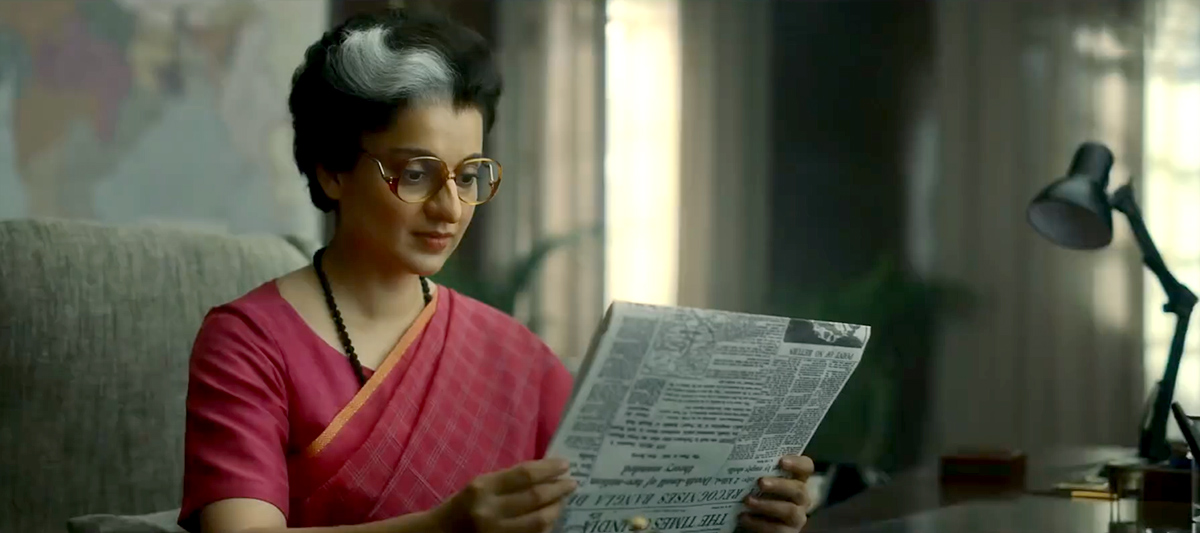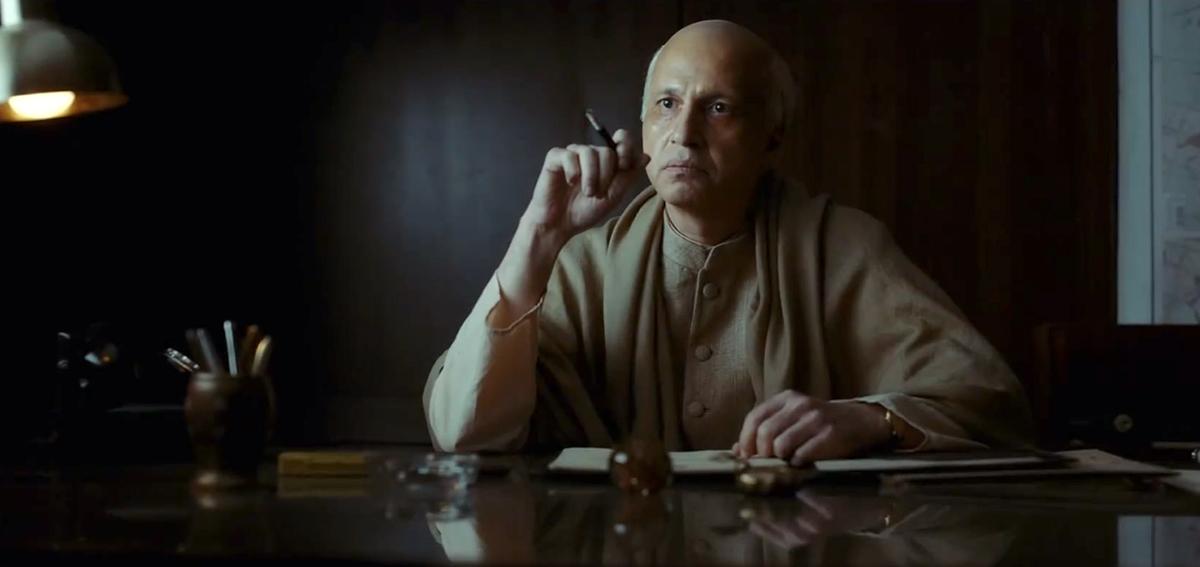As with biopics these days, Kangana Ranaut's films may be less about telling the story of a dark chapter of Indian history and more about giving fodder to those who seek to defend or justify government highhandedness today, observes Utkarsh Mishra.

Of late, the recipe for a Bollywood period drama has been thus. Take up a historical figure or incident, mix it with a flavour of today's politics, make those characters say or do something they never said or did to convince the audience that they were exactly like how they are being portrayed.
Kangana Ranaut's latest film, Emergency, seems little different. The trailer is on expected lines.

By the trailer, it looks like the film is not just about the Emergency and its excesses but also contains Indira Gandhi's political journey to the prime minister's post and her role as head of government.
The initial few seconds give a glimpse of a man, supposedly playing Jawaharlal Nehru, asking his daughter, 'You once learned from me, now you want to teach me?'
Another background voice says 'isne to apne baap ko neeche gira kar kursi cheen li (she trounced her father and usurped his chair)', implying that Indira Gandhi led a coup d'état against her father.
While it is generally accepted that Indira didn't much like her father's democratic attitude, it would be stretching it too far to say that she usurped his chair for this reason.
A snippet in the trailer also shows a female voice (supposedly of her friend and biographer Pupul Jayakar) telling Mrs Gandhi that 'They would hate her for this (Emergency)', to which she replies, with tears in her eyes, 'What else I have got from this country?'
Now it is true, as her letters reveal, that Mrs Gandhi had little admiration for leaders of the Opposition parties and actually believed that they do what they do with the sole purpose of ousting her from power.
Jayakar's book does contain a reference of such a meeting she had with Mrs Gandhi shortly after the proclamation of the Emergency, when the latter was 'shocked' by her old friend tersely asking her, 'How could Nehru's daughter allow this?'
Jayakar recalled that Mrs Gandhi's eyes turned moist while replying to her, but her reply was more about 'saving the country from' Jayaprakash Narayan and Morarji Desai, and less about 'the country hating her'.
In fact, she believed, at least in the initial days of the Emergency, as do several historians and political commentators even now, that the common people didn't really care about curtailed freedom, and instead 'appeared content with the fact that buses and trains plied on time, government employees were punctual and prompt, and crime rates had fallen.'
This is believed to be a reason for both Mrs Gandhi lifting the Emergency and declaring elections 15 months before she legally had to; and jailed Opposition leaders like Charan Singh and Atal Bihari Vajpayee adopting a more conciliatory attitude towards her.
In the trailer, we see more of Vajpayee, played by Shreyas Talpade, than other Opposition leaders equally or more prominent than him at that time.
It shows Mrs Gandhi going to meet Vajpayee, and telling him, 'I came to bargain with an Opposition leader but I met a true patriot.'
While it's true that she sent feelers, through her aides like then minister of state Om Mehta, to jailed Opposition leaders, including Vajpayee, before lifting the Emergency, there's no record of her meeting any of them, much less of her calling Vajpayee a 'true patriot'. (We shouldn't mind it though. In fact, at this point, we should be thankful that the movie doesn't show someone else -- we know who -- getting these accolades from Indira Gandhi.)
The trailer shows Milind Soman in the role of the legendary Field Marshal S H F J Manekshaw, followed by a few visuals of the 1971 War (not without immediately juxtaposing it with a reference to the Simla Agreement of 1972).
The most appropriate, however, seems to be the portrayal of Sanjay Gandhi; as eccentric, as unpredictable, and as temperamental as one finds him in history books.
But the most glaring inconsistency is Ranaut's Indira saying, 'India is Indira, and Indira is India'. It was never said by Mrs Gandhi herself, but by the then Congress president D K Borooah.
In conclusion, I must say that there can never be a defence of the Emergency and all criticism of Mrs Gandhi with respect to it is justified. So it cannot be said that any portrayal of her as a despot is out of place.
However, as with biopics and period dramas these days, Ranaut's films may be less about telling the story of a dark chapter of Indian history and more about giving fodder to those who seek to defend or justify government highhandedness today.
Although, hoping against hope, if it turns out to be otherwise -- borrowing from Justice C N Broomfield's sentence during the trial of Mahatma Gandhi in 1922 -- no one will be better pleased than I.